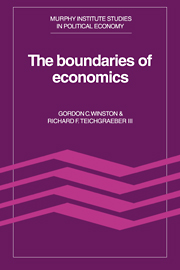Book contents
- Frontmatter
- Contents
- Preface
- Acknowledgments
- List of contributors
- 1 Introduction
- 2 Towards a rhetoric of economics
- 3 Three problems with the treatment of time in economics: perspectives, repetitiveness, and time units
- 4 Hayek, the Scottish school, and contemporary economics
- 5 Reuniting economics and philosophy
- 6 Economic methodology and philosophy of science
- Index
Preface
Published online by Cambridge University Press: 24 March 2010
- Frontmatter
- Contents
- Preface
- Acknowledgments
- List of contributors
- 1 Introduction
- 2 Towards a rhetoric of economics
- 3 Three problems with the treatment of time in economics: perspectives, repetitiveness, and time units
- 4 Hayek, the Scottish school, and contemporary economics
- 5 Reuniting economics and philosophy
- 6 Economic methodology and philosophy of science
- Index
Summary
“When English-speaking philosophers think of economics, they usually have a particular kind of pure theory in mind. This is the class of theories predominantly taught in western universities and often called neo-Classical. Purity here is a matter of conceiving homo economicus in abstraction from his social setting and, more excusably, of forswearing the attempt to make economics part (or all) of a general theory of society. By contrast, political economy, as the term is now used, is just such an attempt and its champions insist that no economic theory can be as pure as neo-Classicals pretend.” This view of the links between philosophy and economic theory, espoused by Frank Hahn and Martin Hollis, is one that the contributors to this volume embrace, even if none of them is a practitioner of “political economy” precisely as it is defined here. This book had its origins in an effort to place neoclassical economic theory (especially conventional textbook microeconomic theory) in the broader context of modern economics with special concern for the boundaries between economics and the other social sciences. The widespread use of textbook theory in business, economic, and political analysis is a clear testament to its power. Yet the restrictions and artificialities of neoclassical economic assumptions also give cause for worry to some of the finest minds in the discipline. These chapters examine two related themes that complicate the conventional “economist's” view of conduct and thereby provide a more complex (and humane) subject of study than the traditional Homo economicus.
- Type
- Chapter
- Information
- The Boundaries of Economics , pp. vii - viiiPublisher: Cambridge University PressPrint publication year: 1988

